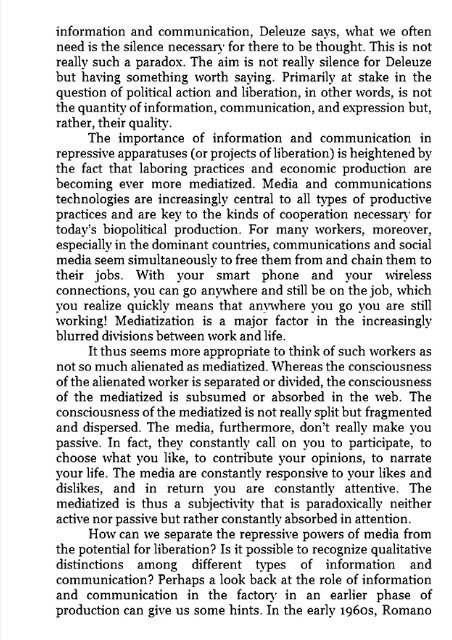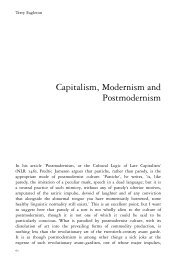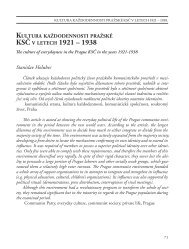Chapter 1: Subjective Figures of the Crisis ... - Negri in English
Chapter 1: Subjective Figures of the Crisis ... - Negri in English
Chapter 1: Subjective Figures of the Crisis ... - Negri in English
You also want an ePaper? Increase the reach of your titles
YUMPU automatically turns print PDFs into web optimized ePapers that Google loves.
<strong>in</strong>formation and communication, Deleuze says, what we <strong>of</strong>ten<br />
need is <strong>the</strong> silence necessary' for <strong>the</strong>re to be thought. This is not<br />
really such a paradox. The aim is not really silence for Deleuze<br />
but hav<strong>in</strong>g someth<strong>in</strong>g worth say<strong>in</strong>g. Primarily at stake <strong>in</strong> <strong>the</strong><br />
question <strong>of</strong> political action and liberation, <strong>in</strong> o<strong>the</strong>r words, is not<br />
<strong>the</strong> quantity <strong>of</strong> <strong>in</strong>formation, communication, and expression but,<br />
ra<strong>the</strong>r, <strong>the</strong>ir quality.<br />
The importance <strong>of</strong> <strong>in</strong>formation and communication <strong>in</strong><br />
repressive apparatuses (or projects <strong>of</strong> liberation) is heightened by<br />
<strong>the</strong> fact that labor<strong>in</strong>g practices and economic production are<br />
becom<strong>in</strong>g ever more mediatized. Media and communications<br />
technologies are <strong>in</strong>creas<strong>in</strong>gly central to all types <strong>of</strong> productive<br />
practices and are key to <strong>the</strong> k<strong>in</strong>ds <strong>of</strong> cooperation necessary' for<br />
today's biopolitical production. For many workers, moreover,<br />
especially <strong>in</strong> <strong>the</strong> dom<strong>in</strong>ant countries, communications and social<br />
media seem simultaneously to free <strong>the</strong>m from and cha<strong>in</strong> <strong>the</strong>m to<br />
<strong>the</strong>ir jobs. With your smart phone and your wireless<br />
connections, you can go anywhere and still be on <strong>the</strong> job, which<br />
you realize quickly means that an where you go you are still<br />
work<strong>in</strong>g! Mediatization is a major factor <strong>in</strong> <strong>the</strong> <strong>in</strong>creas<strong>in</strong>gly<br />
blurred divisions between work and life.<br />
It thus seems more appropriate to th<strong>in</strong>k <strong>of</strong> such workers as<br />
not so much alienated as mediatized. Whereas <strong>the</strong> consciousness<br />
<strong>of</strong> <strong>the</strong> alienated worker is separated or divided, <strong>the</strong> consciousness<br />
<strong>of</strong> <strong>the</strong> mediatized is subsumed or absorbed <strong>in</strong> <strong>the</strong> web. The<br />
consciousness <strong>of</strong> <strong>the</strong> mediatized is not really split but fragmented<br />
and dispersed. The media, fur<strong>the</strong>rmore, don't really make you<br />
passive. In fact, <strong>the</strong>y constantly call on you to participate, to<br />
choose what you like, to contribute your op<strong>in</strong>ions, to narrate<br />
your life. The media are constantly responsive to your likes and<br />
dislikes, and <strong>in</strong> return you are constantly attentive. The<br />
mediatized is thus a subjectivity that is paradoxically nei<strong>the</strong>r<br />
active nor passive but ra<strong>the</strong>r constantly absorbed <strong>in</strong> attention.<br />
How can we separate <strong>the</strong> repressive powers <strong>of</strong> media from<br />
<strong>the</strong> potential for liberation Is it possible to recognize qualitative<br />
dist<strong>in</strong>ctions among different types <strong>of</strong> <strong>in</strong>formation and<br />
communication Perhaps a look back at <strong>the</strong> role <strong>of</strong> <strong>in</strong>formation<br />
and communication <strong>in</strong> <strong>the</strong> factor}' <strong>in</strong> an earlier phase <strong>of</strong><br />
production can give us some h<strong>in</strong>ts. In <strong>the</strong> early 1960s, Romano










